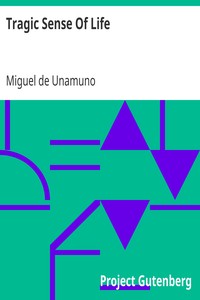Tragic Sense Of Life
Author: Miguel de Unamuno
Bookshelves: Philosophy & Ethics, Religion/Spirituality/Paranormal, Category: Philosophy & Ethics

Summary
"Tragic Sense of Life" by Miguel de Unamuno is a philosophical treatise written in the early 20th century. It explores profound themes concerning human existence, the quest for meaning, and the relationship between individual and collective identity, particularly within the context of Spanish culture. Unamuno delves into the core of human experience, examining the inner struggles of individuals seeking immortality and the inherent tragedies of life. The opening of the book sets the stage for Unamuno's exploration of what it means to be human, emphasizing the importance of concrete experiences over abstract ideals. He argues that philosophy should center around the "man of flesh and bone"—the real, living person rather than an abstract idea of humanity. The text discusses various philosophers, showcasing how their personal experiences shape their thoughts and beliefs. Unamuno introduces the communication between intellect and emotion, positing that the longing for immortality is a fundamental human drive that influences both thought and behavior. Through this lens, the reader is invited to reflect on their own existential dilemmas and the significance of individual identity amidst broader societal constructs. (This is an automatically generated summary.)
 LibraryManager
LibraryManager